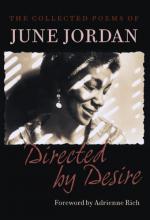|
This section contains 180 words (approx. 1 page at 300 words per page) |

|
There's so much right about "Dry Victories"—the two characters, who are alive, funny, bitter, cool; the magnificent selection of photographs: slaves and cotton pickers, Congressmen and civil rights leaders, police clubs and hoses at Birmingham and a bombed church, a smiling Southern President and the casket of a Northern one, the whole pictorial history of three decades of hope, anguish, despair—that it's a shame the book isn't completely successful.
The fault here is that while the problems are stated clearly, the conclusions are hazy. Miss Jordan says voting isn't "where it's at"—that civil rights are meaningless without the "economic bases of freedom." Yet nowhere does she deal with the forces that have served to maintain, or at least permit poverty.
"Dry Victories" ends with the boys hoping that "parents and them other folk" will … "do something." But what has obstructed that "something," or what it...
|
This section contains 180 words (approx. 1 page at 300 words per page) |

|


